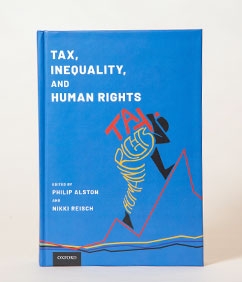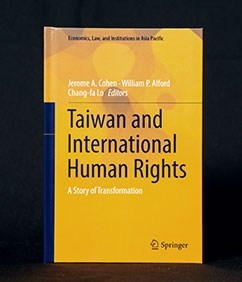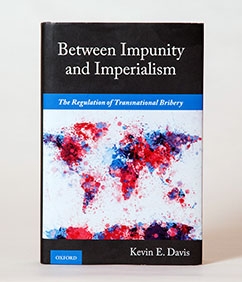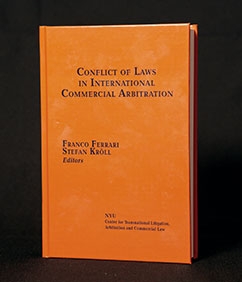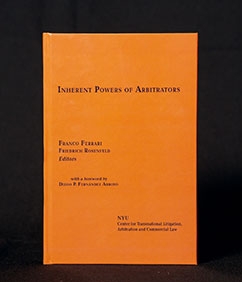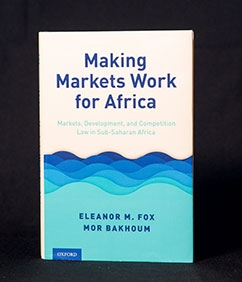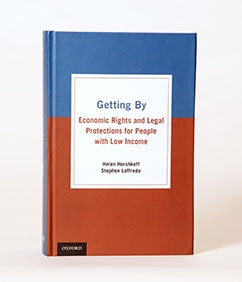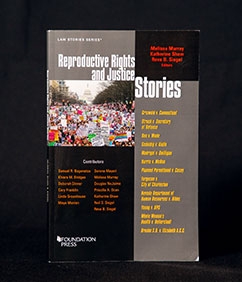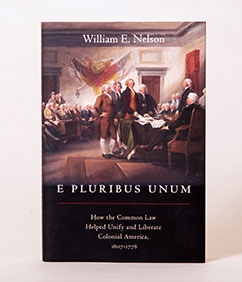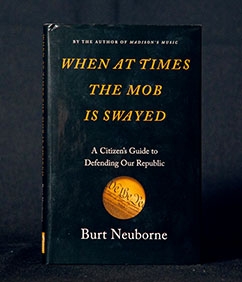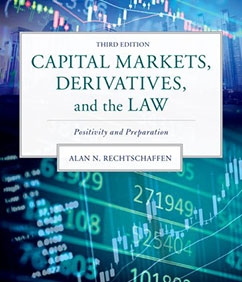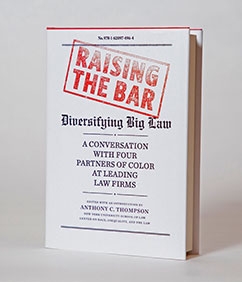Read all about it: NYU Law faculty books of 2019

Mass incarceration. Transnational bribery. International arbitration. Vulnerable democracies. These are just a few of the topics NYU Law faculty members tackled in recent books that they authored or edited. A round-up of the books that full-time faculty members published in 2019 is below. (Book descriptions are excerpted from publishers’ websites.)
Philip Alston & Nikki Reisch eds., Tax, Inequality, and Human Rights (Oxford University Press)
“[This book] showcases interdisciplinary perspectives on tax policy and human rights. [It] provides topical analysis of recent international tax reforms and their implications for human rights [and also] shows how structural biases in the tax regime impact human rights.”
Rachel Elise Barkow, Prisoners of Politics: Breaking the Cycle of Mass Incarceration (Harvard University Press/Belknap)
“Rachel Barkow explains how dangerous it is to base criminal justice policy on the whims of the electorate, which puts judges, sheriffs, and politicians in office. Instead, she argues for an institutional shift toward data and expertise, following the model used to set food and workplace safety rules. Barkow’s prescriptions are rooted in a thorough and refreshingly ideology-free cost-benefit analysis of how to cut mass incarceration while maintaining public safety. She points to specific policies that are deeply problematic on moral grounds and have failed to end the cycle of recidivism.”
Jerome A. Cohen, William P. Alford & Chang-fa Lo eds., Taiwan and International Human Rights: A Story of Transformation (Springer)
“This book tells a story of Taiwan’s transformation from an authoritarian regime to a democratic system where human rights are protected as required by international human rights treaties. There were difficult times for human rights protection during the martial law era; however, there has also been remarkable transformation progress in human rights protection thereafter.… The comprehensive coverage of this book should be able to give readers a well-rounded picture of Taiwan’s human rights performance. Readers will find appealing the story of the effort to achieve high standards of human rights protection in a jurisdiction barred from joining international human rights conventions.”
Kevin E. Davis, Between Impunity and Imperialism: The Regulation of Transnational Bribery (Oxford University Press)
“[This work] describes the legal regime that regulates transnational bribery, identifies and explains the rationales that have guided its evolution, and suggests directions for reform. The broad argument is that the current regime embodies a set of values, theories, and practices labeled the ‘OECD paradigm.’ A key premise is that transnational bribery is a serious problem which merits a vigorous legal response, particularly given the difficulty of detecting instances of bribery. This book explores both the OECD paradigm and the anti-imperialist critique, and provides a detailed analysis of their implications for the key elements of transnational bribery law.”
Franco Ferrari & Stefan Kröll eds., Conflict of Laws in International Commercial Arbitration (JurisNet)
“[F]eaturing chapters from leading figures and authorities in the field, [this book] shows that at every stage of an international arbitration, conflict of laws issues will arise and will have to be dealt with. International arbitration requires a conflict of laws analysis to identify the law applicable to the most disparate issues, and this needs to be done, for example, at all stages of the award process, from the pre-award stage to the post-award stage.”
Franco Ferrari & Friedrich Rosenfeld eds., Inherent Powers of Arbitrators (JurisNet)
“Arbitrators derive their powers from an agreement between contracting parties or the law of the place of arbitration. However, because even the most complete arbitration agreements, arbitration rules or laws cannot cover every situation an arbitrator may face in carrying out his or her duties, arbitrators increasingly have exercised powers not expressly conferred by these two sources.… The tension between these tendencies illuminates the complexity of a question that extends to the heart of the arbitrator’s very ability to act and the fate of the arbitral award.… [This book] offers multiple perspectives on this important debate and valuable insight into these diverging trends.”
Eleanor M. Fox & Mor Bakhoum, Making Markets Work for Africa: Markets, Development, and Competition Law in Sub-Saharan Africa (Oxford University Press)
“[This book] describes markets, market power, and the law that controls market power in countries in sub-Saharan Africa, and how that power can be controlled, in clear language and compelling narrative that combines law, economics, and social and political policy. [It] gives clarity to a complicated subject by presenting the facts, the legal concepts, and the economic and socio-political concepts. [It also] integrates subject areas usually dealt with separately, including antitrust (competition law), market policy in general, trade and investment, relevance of poverty and inequality.”
Helen Hershkoff & Stephen Loffredo, Getting By: Economic Rights and Legal Protections for People with Low Income (Oxford University Press)
“Getting By offers an integrated, critical account of the programs, rights, and legal protections that most directly affect poor and low-income people in the United States, whether they are unemployed, underemployed, or employed, and whether they work within the home or outside the home. The book covers cash assistance programs, employment and labor rights, food assistance, health care, housing programs, education, consumer and banking laws, rights in public spaces, judicial access, and the right to vote.… The central goal of this volume is to provide a resource to individuals, groups, and communities that wish to claim existing rights and mobilize for progressive change.”
James B. Jacobs & Zoe Fuhr, The Toughest Gun Control Law in the Nation: The Unfulfilled Promise of New York’s SAFE Act (New York University Press)
“In [this book], James B. Jacobs and Zoe Fuhr ask whether [New York’s] 2013 SAFE Act—hailed by Governor Andrew Cuomo as “the nation’s toughest gun control law”—has lived up to its promise. [The authors] illuminate the gap between gun control on the books and gun control in action. They argue that, to be effective, gun controls must be capable of implementation and enforcement. This requires realistic design, administrative and enforcement capacity and commitment and ongoing political and fiscal support. They show that while the SAFE Act was good symbolic politics, most of its provisions were not effectively implemented or, if implemented, not enforced.”
Ivan Krastev & Stephen Holmes, The Light that Failed: A Reckoning (Penguin Books)
“Why did the West, after winning the Cold War, lose its political balance? In this brilliant work of political psychology, Ivan Krastev and Stephen Holmes argue that the supposed end of history turned out to be only the beginning of an Age of Imitation. Reckoning with the history of the last thirty years, they show that the most powerful force behind the wave of populist xenophobia that began in Eastern Europe stems from resentment at the post-1989 imperative to become Westernized.”
Benedict Kingsbury, David M. Malone, Paul Mertenskötter, Richard B. Stewart, Thomas Streinz & Atsushi Sunami eds., Megaregulation Contested: Global Economic Ordering After TPP (Oxford University Press)
“The leading work on the Trans-Pacific Partnership as finally adopted in 2018, with authors from 15 Asia-Pacific jurisdictions inside and outside TPP, strongly focused on developing countries and societies in Asia and Latin America. [It] introduces the key concept of ‘megaregulation’ and closely explores major critical perspectives on contemporary international economic governance and its future.”
Melissa Murray, Katherine Shaw & Reva B. Siegel eds., Reproductive Rights and Justice Stories (Foundation Press)
“This book tells the movement and litigation stories behind important reproductive rights and justice cases. The twelve chapters span topics including contraception, abortion, pregnancy, and assisted reproductive technologies, telling the stories of these cases using a wide-lens perspective that illuminates the complex ways law is debated and forged—in social movements, in representative government, and in courts.… Reading the cases together highlights the lived horizon in which individuals have encountered and struggled with questions of reproductive rights and justice at different eras in our nation’s history—and so reveals the many faces of law and legal change.”
William E. Nelson, E Pluribus Unum: How the Common Law Helped Unify and Liberate Colonial America, 1607-1776 (Oxford University Press)
This book examines the role of the common law in the life and politics of Great Britain’s North American colonies from the founding of Virginia in 1607 to the outbreak of the American Revolution in 1775-76. The main theme of the book is that when the different colonies were initially founded, they followed very different law—typically not the common law of England. But over the course of the seventeenth century and first half of the eighteenth century, the colonies all received the common law, with the result that by the 1750s the common law constituted the foundation of every colony’s law and every colony’s political system.
Burt Neuborne, When at Times the Mob is Swayed: A Citizen’s Guide to Defending Our Republic (New Press)
“In an erudite and brilliant evaluation of the current state of our government, noted constitutional scholar Burt Neuborne administers a stress test to democracy and concludes that our unprecedented sets of constitutional protections, all endorsed by both major parties, stand between us and an authoritarian federal regime fronted by Donald Trump’s tweets: namely the division of powers between the three branches, the rights reserved to the states, and the Bill of Rights.… Neuborne argues that while the Constitution’s inherent defense mechanisms can buy us time, only an active citizenry will allow us to fulfill Ben Franklin’s charge [—‘A republic, if you can keep it.’]”
Alan N. Rechtschaffen, Capital Markets, Derivatives, and the Law (Oxford University Press)
“[This book] investigates the impact of the financial crisis on capital markets and regulation. With an emphasis on the structure and the workings of financial instruments, it considers market evolution after the crisis and the impact of Central Bank policy. In doing so, it provides the reader with the tools to recognize vulnerabilities in capital market trading activities.”
David A.J. Richards, Boys’ Secrets and Men’s Loves: A Memoir (Xlibris)
“[This] is the memoir of a law professor who has written over twenty books on the basic rights of American constitutionalism. He has been a prominent advocate of gay rights and feminism, which joins men and women in resistance. A gay man born into an Italian American family in New Jersey, he relates in this book his own experience on how the initiation of boys into patriarchy inflicts trauma … and how (through art, philosophy, and experience—including mutual love) he and others (straight and gay men) come to join women in resisting patriarchy through the discovery of how deeply it harms men as well as women.”
John Sexton, Standing for Reason: The University in a Dogmatic Age (Yale University Press)
“John Sexton argues that over six decades, a ‘secular dogmatism,’ impenetrable by dialogue or reason, has come to dominate political discourse in America. Political positions, elevated to the status of doctrinal truths, now simply are ‘revealed.’ Our leaders and our citizens suffer from an allergy to nuance and complexity, and the enterprise of thought is in danger. Sexton sees our universities, the engines of knowledge and stewards of thought, as the antidote, and he describes the policies university leaders must embrace if their institutions are to serve this role.”
Anthony C. Thompson ed., Raising The Bar: Diversifying Big Law, A Conversation with Four Partners of Color at Leading Law Firms (New Press)
“In Raising the Bar, four partners of color from leading law firms engage in a no-holds-barred conversation about what it takes to make it in big law using their own journeys to the top to discuss how law firms can do a better job of attracting and holding on to a more diverse set of young attorneys. They also offer advice to the attorneys themselves on how to succeed in a culture that has long excluded them.”
NOTE: Contributors to this book include Debo Adegbile '94, Lisa Davis '85, Damaris Hernández '07, and Ted Wells.
Casebooks and supplements
Stephen J. Choi & A.C. Pritchard, Securities Regulation: Cases and Analysis (Foundation Press 5th ed.)
E. Allan Farnsworth, Carol Sanger, Neil B. Cohen, Richard R.W. Brooks & Larry T. Garvin, Contracts: Cases and Materials (Foundation Press 9th ed.)
Jack H. Friedenthal, Arthur R. Miller, John E. Sexton & Helen Hershkoff, 2019-2020 Civil Procedure Supplement for Use with All Pleading and Procedure Casebooks (West Academic Publishing 2019)
Jeanne C. Fromer & Christopher Jon Sprigman, Copyright Law: Cases and Materials (Creative Commons)
Geoffrey P. Miller, The Law of Governance, Risk Management, and Compliance (Wolters Kluwer 3d ed.)
Richard L. Revesz & Michael A. Livermore, Environmental Law & Policy (Foundation Press 4th ed.)
Posted December 19, 2019; updated December 20, 2019


